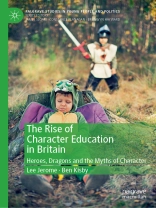What is character education? Why has it risen up the political agenda in the UK in recent years? And what does it mean in pedagogical practice? This book addresses these questions, challenging the individualistic and moralistic ideas underlying the clamour amongst politicians, educators and authors to promote ‘grit’, ‘resilience’ and ‘character’ in schools. Closely examining a range of teaching resources, the book shows that the development of character is wrongly presented as the solution to a wide variety of social problems, with individual citizens expected to accommodate themselves to the realities of the contemporary economic context, rather than enhancing their capacities to engage in civic and political activities to bring about changes they wish to see. The book argues that there is a tried and tested alternative to character education, which is far more likely to strengthen British democracy, namely, citizenship education.
Inhaltsverzeichnis
1 Introduction.- 2 Theorising Character Education.- 3 Character Education in Historical Context.- 4 The Jubilee Centre’s Character Education Teaching Resources.- 5 There Case Studies of Character Education in Practice.- 6 Character Education or Citizenship Education?.- 7 Conclusion.- Index.
Über den Autor
Lee Jerome is Associate Professor of Education at Middlesex University, UK. He has published widely and explores three main themes in his research: citizenship education, children’s rights and teacher education. He is a founder-member of the Association for Citizenship Teaching (ACT), and is co-editor of ACT’s journal Teaching Citizenship.
Ben Kisby is Senior Lecturer in Politics at the University of Lincoln, UK. He has a number of publications on citizenship education. His research interests focus on British politics, public policy and youth political engagement. He co-founded the Political Studies Association’s Young People’s Politics specialist research group.












